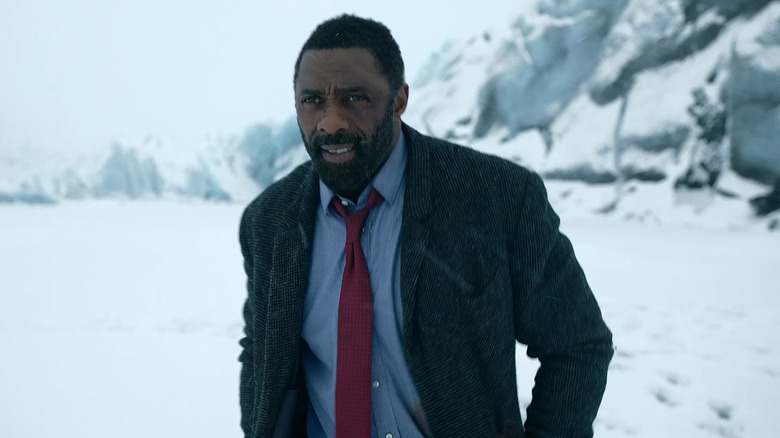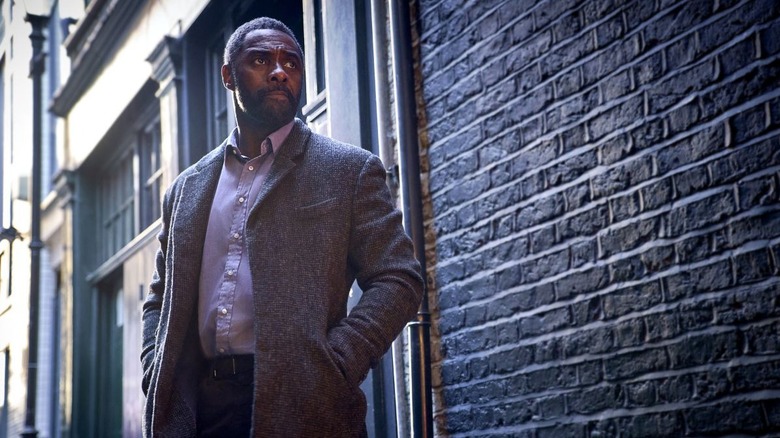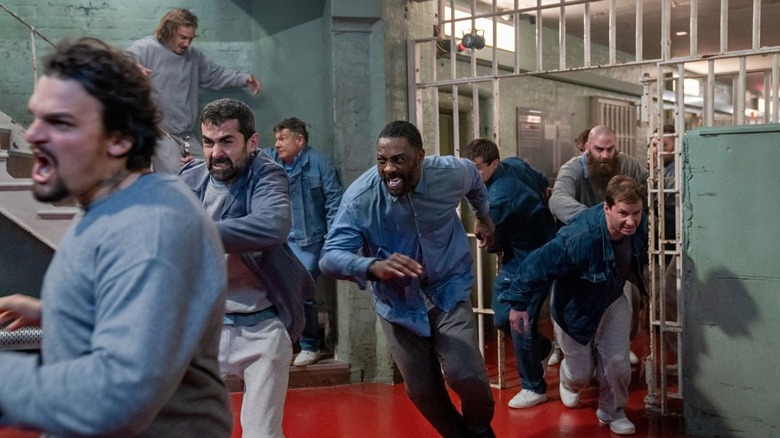Luther: The Fallen Sun Review: The Award-Winning Series Rises Again
- Avoids the curse of TV-to-movie adaptations, if only because an over-the-top serial killer drama works far better in feature form
- Takes inspiration from the Daniel Craig era of Bond movies, which helps the series expand in scale for the big screen
- Andy Serkis' villain is a delightfully campy, genuinely nasty creation
- Don't expect any deeper social commentary, no matter how much it alludes towards it -- this is a thriller best enjoyed with your brain switched off
Despite being praised for its gritty storytelling, the BBC's crime procedural "Luther" is one of the most over-the-top detective series to have ever graced the small screen. Its storylines are dark on the surface, but that self-conscious darkness is always depicted via melodrama that pushes beyond the limits of plausibility. The menacing villains could equally be at home in a James Bond spy romp, while Idris Elba's protagonist becomes such an overblown parody of the tortured detective archetype, he indirectly inspired a British sitcom parodying the self-serious grit of contemporary cop dramas, in the style of "The Naked Gun" ("A Touch Of Cloth," co-written by "Black Mirror" creator Charlie Brooker).
As a result, the character of John Luther makes for a much better fit on the big screen, where the show's overblown storylines transform from a liability into an asset. Although a loose continuation of the series, picking up from where 2019's fifth season left off, "Luther: The Fallen Sun" has clearly been devised as a soft relaunch by creator and screenwriter Neil Cross and veteran series director Jamie Payne, here making his feature debut. Very few ties to the source material are kept, with only one other character of note other than the titular figure returning to the fold (Dermot Crowley as Martin Schenk, Luther's former boss), while the opening title card simply reads "Luther," deviating from the film's given title in what seems like a statement of intent. The film appears to tell die-hard fans that this is a return to basics and that newcomers shouldn't be burdened by what came before — this is all the introduction to the crime saga you need to enjoy yourself.
Will satisfy fans and newcomers alike
For this reviewer, a casual viewer of the BBC series who by no means made it appointment viewing, this approach works like a treat, leaning more into its inherent silliness without compromising on the murkier elements that give it an edge amongst like-minded crime procedurals. We do pick up where that fifth season left off, with John Luther (Elba) now imprisoned after his illegal tactics to catch criminals have been exposed, all the context a newcomer needs to understand what makes this character tick: a pursuit of justice at all costs that frequently becomes destructive to himself and those around him. However, his time behind bars is short-lived as he soon becomes fixated on a case he couldn't solve in the serial killing spree being carried out by cyber-terrorist David Robey (a delightfully theatrical Andy Serkis), who continues to taunt the now-former detective in his cell.
Robey helms a dark-web empire that live-streams elaborate murders to audiences of thousands, frequently catfishing and blackmailing innocent people in his search for more onscreen victims. Most of these schemes are left to the imagination, but the ones that are revealed — namely, a man who was catfished and found himself committing an act of sexual assault against someone he believed to be in a consensual BDSM-adjacent relationship with — give enough depth as to why several people would be more than eager to die by suicide on camera instead of facing up to their guilty consciences. As viewers of "Luther" have come to expect, the subject matter is far darker than many a police procedural, but it's handled in such an over-the-top way, labeling it "gritty" feels deeply inaccurate.
With the vast majority of the TV supporting cast left off-screen, we get more familiar, big-screen friendly faces joining Elba in this outing — not just Serkis as the villain, but the great Cynthia Erivo as detective Odette Raine, whose desire to catch villains by the book throws her into conflict with John Luther, only for both to get thrown into the same trap, as nobody who gets close to him can leave the story unscathed.
If you or anyone you know has been a victim of sexual assault, help is available. Visit the Rape, Abuse & Incest National Network website or contact RAINN's National Helpline at 1-800-656-HOPE (4673).
If you or anyone you know is having suicidal thoughts, please call the National Suicide Prevention Lifeline by dialing 988 or by calling 1-800-273-TALK (8255).
A Bond-style big screen makeover
Although the small screen series had several elaborately staged sequences which pushed the limitations of the BBC's threadbare budgets — let us not forget how many nightmares were caused by the bus murder in the Season 5 premiere — "The Fallen Sun" gives Cross and Payne a chance to scale their ambitions up further. I've used the Bond comparison already in relation to the series' litany of villains, and Serkis' Robey is the closest "Luther" has come to creating an adversary who you could easily imagine torturing 007; the motivations and the accent may be different, but in his campy stage presence (something which really comes to the fore as he hosts his live streams like a twisted game show host) he bares more than a striking similarity to Javier Bardem's Raoul Silva in "Skyfall."
But the comparisons to Britain's biggest film franchise extend far beyond character similarities, with various set pieces taking cues from the recent Daniel Craig era. As with "Skyfall," there's a dramatic chase sequence leading us around several London landmarks, deep into the underground tube network, and the epic finale takes us overseas to a snowy villain lair that would have been equally at home in "Spectre" or "No Time to Die." Yes, these are all largely surface-level comparisons, but they exist as clear statements of intent regardless. Besides, the Craig era of that franchise grappled with many of the same thematic obsessions as "Luther," such as breaking the rules to achieve justice and the morality of killing to save others. Whether they're tortured, crooked detectives, or conflicted super spies, nobody can conduct espionage in Britain with a clean conscience, if the past decade of pop culture is to be believed.
"Luther: The Fallen Sun" is a deeply entertaining thriller but one that falls apart under scrutiny very quickly if any of these themes were to be analyzed with any greater depth. At a time when the abuse of power by police is coming under increased scrutiny on both sides of the Atlantic, don't expect any greater commentary than a rookie cop telling an escaped-from-incarceration Luther that he looks up to him despite his illegal methods to get justice. And then there are Robey's dark web streams, which we see are watched exclusively by a gawping audience of men. Any connections to online chat rooms and message boards where anonymous users cheer on terror attacks in real-time, a bleak occurrence now regularly revealed in news reports just moments after real tragedies unfold, must be filled in entirely by the viewer. Judging by the early 2000s aesthetic of Robey's dark website, it's safe to say neither Cross nor Payne is particularly interested in making an old-fashioned serial killer thriller appear relevant to a modern context; this could have been made at any point in the last 20 years, with no script revisions required.
Luckily, "Luther: The Fallen Sun" is thrilling enough as a straightforward detective drama that it has no clear need to modernize its story. I suspect both die-hard fans and newcomers to this world will leave satisfied due to how it avoids the curse of most TV-to-film adaptations — this is purely a feature-length episode of "Luther," told on a scale beyond what the BBC's budget could ever allow.
"Luther: The Fallen Sun" arrives on Netflix on Friday, March 10.


